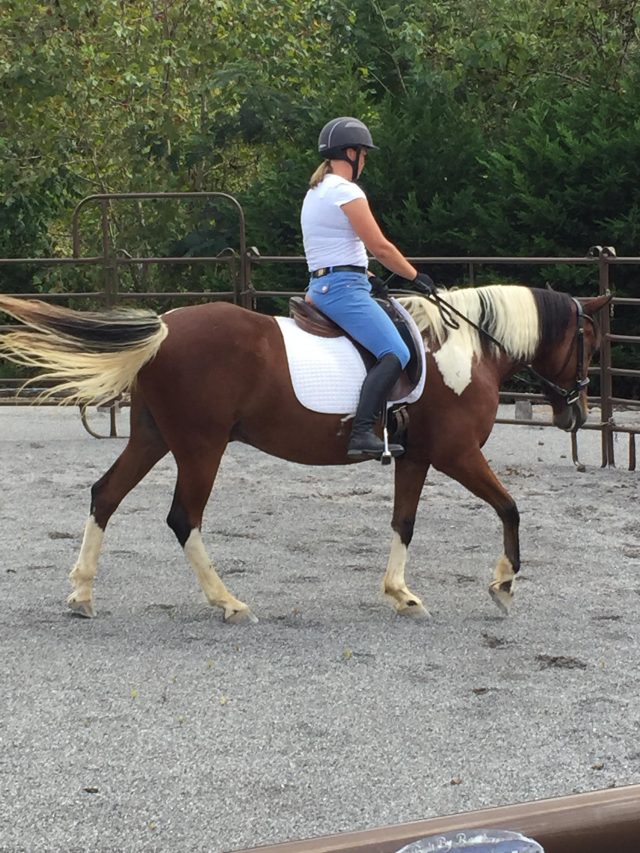
Happy, Healthy & Horsey: Support as We Change
Or, how to be our own supporting rein.
Change is rarely easy. Change, by its very definition, means doing something new or different from what one was originally doing. “New” or “different” can be challenging to process, and having good support during a time of change can help relieve the challenges associated with change.
For example, experienced trail riders often take a seasoned trail horse along whenever they are introducing a “green bean” to trail riding. The savvy horse provides support for the newbie horse by showing there is no reason to fear crossing a creek or meeting wildlife on the trail. Similarly, a lead pony provides support to an energetic race horse as they head out to the starting gate.
Change of direction and rebalancing can be challenging for our horses, and, metaphorically, for ourselves as well. In both instances, having good support can help assure us of success.
With regard to changing direction and rebalancing, the keys to providing support include a great seat and a supportive outside rein. As USDF adult amateur rider Dara Lindner illustrates, these two riding “tools” provide the support to facilitate excellent change of direction and rebalancing.
In the first photo, Dara is providing a great supporting outside rein. The contact is gentle and consistent, which supports Kaliwohi as he shifts his weight to the inside bend. Dara’s seat asks Kiwi to come through from behind, which gently compresses his spine from tail to nose. This allows Kiwi to be balanced enough to take a bold step behind, and brings the spine up to support the rider. Note the loose inside rein, so Kiwi has an open invitation to tip his nose to the inside and begin to bend around Dara’s inside leg.
As the next photo illustrates, Dara maintains the outside supporting rein as Kiwi shifts his weight to take a step. The supporting outside rein is critical at this moment, so Kiwi’s shoulders do not drift to the outside, but, instead, he bends laterally to the left, compressing his ribcage on his left side (inside) while expanding it on his right (outside). It is this lateral bend that creates balance throughout the horse’s body when turning. The inside rein remains open to encourage Kiwi to continue tipping his nose to the inside, so the lateral bend is complete from tail to nose.
As Kaliwohi completes the step and his weight shifts forward, Dara maintains the outside supporting rein so Kiwi will step forward without falling off balance to the outside. This allows the outside foreleg to come closer to the inside foreleg as the horse completes a bending step around the rider’s inside leg. These are the baby steps towards leg-yield and half-pass.
With respect to humans and being both happier and healthier, changing our own direction of thought, especially in the area of self-esteem and self-talk, can seem challenging indeed.
I have wasted years in the constricted realm of negative self-talk and low self-esteem. The things I’ve said to myself, such as, “you’re a failure,” “you’ll never succeed,” “you don’t deserve success,” “you’re so fat,” etcetera, etcetera, ad nauseum, are appalling. I would never say such things to a friend, a colleague, or even a total stranger who was endeavoring to better herself in any way.
So why have I berated myself for so long? Shouldn’t we be our own BFF? We so easily uplift and support others as they change and grow, yet, when we ourselves decide to change and grow, sometimes we are defeated by nothing more than self-sabotage.
It is helpful, then, to have our own mental “outside rein” to provide support to check us from falling outside the change we want to create in our life and getting off track. That mental support can be many things. Deep breathing, to rid our body instantly of toxins and reset our anxiety levels to a more manageable level. Identifying negative self-talk and policing it right out of our brain and, instead, substituting a positive thought – something we actually like about ourselves. (Trust me, this can be really challenging if one has been berating oneself for decades!) Sharing challenging moments with supportive friends can help us feel like we’re not alone in the changing environment we find ourselves trying to navigate successfully.
There are many ways to create positive mental support for any life change you are about to make, whether it’s changing your eating habits or changing jobs or moving to an entirely new place.
And, just like the outside rein, that support can provide just what you need to successfully change direction with balance and achieve your goal!
Go riding.









Leave a Comment